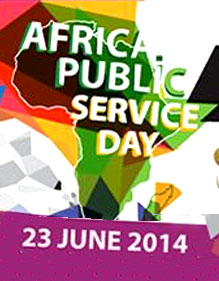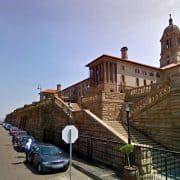|
Getting your Trinity Audio player ready...
|
 By Valencia Talane
By Valencia Talane
The public service component of any society is really the backbone on which it relies for its survival. South Africans are served by over three-million public officials across the three levels of government and in its various entities and agencies.
The high standard of service required from each of these individuals is qualified by the country’s Constitution. In section 195 it “…establishes basic values and principles governing public administration across all spheres of government, including the promotion and maintenance of high standards of professional ethics…”
To celebrate the valued service of the public sector, 23 June is set aside annually as Public Service Day. The date was declared by the UN as one to be observed by its member states. Across Africa, it is referred to as Africa Public Service Day.
In South Africa, the public sector integrity management framework, which was put together by the Department of Public Service and Administration (DPSA) in 2011, was introduced to align all existing measures regulating ethics and integrity in the public sector. This, the department hoped, would help it achieve several objectives – among others, it would:
- strengthen existing measures regulating probity in the public service;
- strengthen capacity to prevent corruption;
- monitor and evaluate to ensure compliance; and
- use enforcement as a deterrent.
Responding to the debate on his recent State of the Nation address in Parliament, President Jacob Zuma said: "We want government to deliver services faster and more efficiently. More importantly, we want members of the public seeking services to be treated with respect, patience, understanding and courtesy."
Corruption in the public sector
Reports received by Corruption Watch since its establishment in 2012 indicate that corruption, or perceived corruption is rife within the public sector, and that it comes in a range of forms from procurement-related irregularities to nepotism and the practice of “ghost employees”.
Corruption Watch has investigated several of these cases in the last two and a half years. In one case of alleged inflation of a quote, a procurement officer working for JS Moroka Municipality in Mpumalanga not only bloated the cost of supplies needed by her employer, but also diverted the original business to a relative’s firm, creating the impression that it was this relative who had supplied the municipality at a higher cost.
A more recent case involved the manager of a government-owned tourist attraction who again is alleged to have diverted business in the form of guest patronage towards a relative’s private business. The relative is one of several service providers to the establishment. In both these cases, the relevant departments have undertaken investigations into the allegations put to them by Corruption Watch.
Public servants are concerned about corruption
On an upbeat note, Corruption Watch conducted a survey of its reporters earlier this year to determine where complaints are coming from. An overwhelmingly large number of complaints in the organisation’s database originated from public servants who witness what they perceive to be corruption within their departments.
At the time of the release of the survey, executive director David Lewis said: “There are clearly key government leaders and institutions that are deeply concerned about corruption. The ministers of finance, health and public service and administration stand out.” Pravin Gordhan was then finance minister, while DPSA was led by Lindiwe Sisulu.
Lewis added that random surveys of Corruption Watch reporters undertaken in 2012 and 2013 show that by far the largest demographic group reporting to us are African males between 30 and 39. Almost half of them have tertiary education, while than 60% are employed and at least 50% are in public sector jobs.
In an interview with Business Day, the new DPSA minister Collins Chabane acknowledged that the work ahead – that of getting the three-million-strong public service to work – is a big challenge, but said his team is up to the task.
“…there is some corruption taking place in government institutions,” he said. “In the main it happens because we are not able to adhere to the systems. There is a perception of corruption – which may be a reality – and it is up to us to ensure that that perception is reduced and the reality itself is also reduced.”
One of the achievements of the DPSA is getting the Public Administration Management Bill to the point where it is now waiting for Zuma to sign it into law. The bill will prohibit public servants from doing business with the state.








